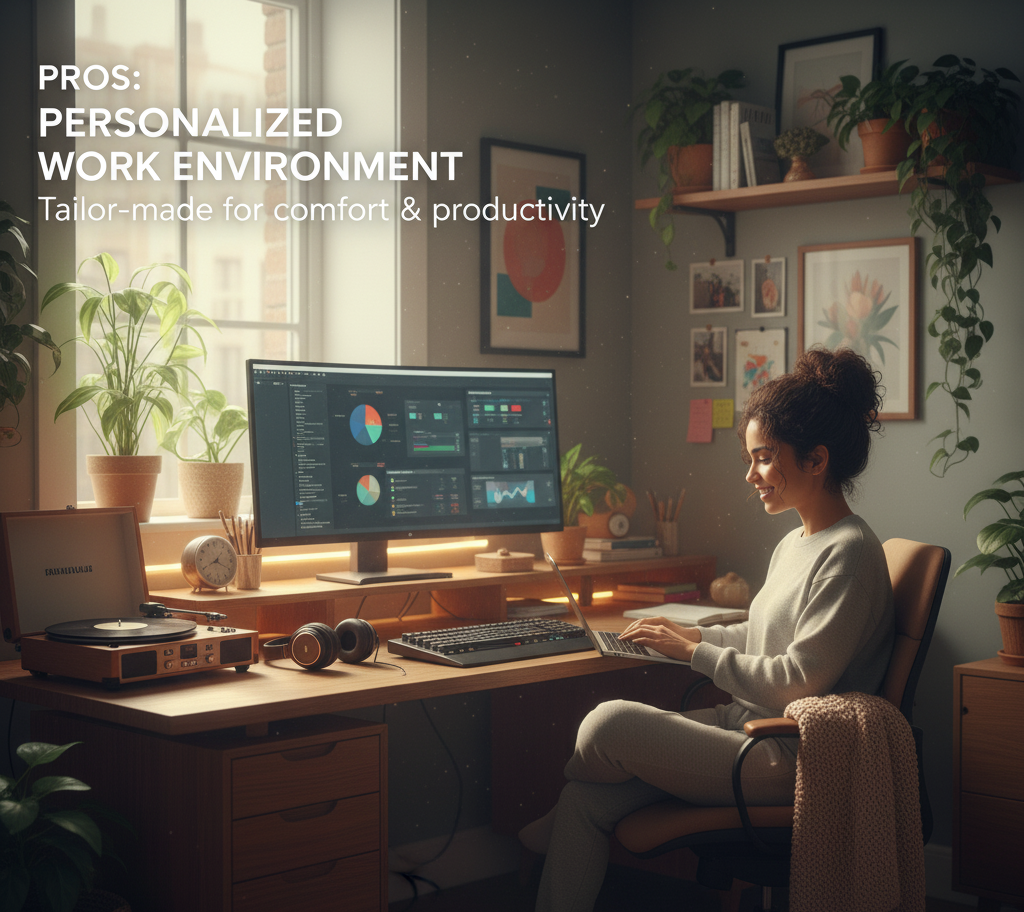Introduction
The concept of working from home has evolved from a temporary solution during the pandemic to a permanent lifestyle for millions of professionals worldwide. While the headlines usually highlight flexibility, freedom, and work-life balance, there’s pros and cons of work from home jobs more to the story than meets the eye. Beneath the surface, remote jobs bring unique advantages and subtle challenges that often go unnoticed.
Many blogs and career guides celebrate the perks of remote work, but few dive into the complexities that actually shape the day-to-day experience. From the surprising productivity boosts to the less glamorous realities of social isolation, remote work comes with trade-offs worth discussing. Understanding these hidden dimensions is crucial because it enables you to prepare more effectively, set realistic expectations, and make informed career choices.
In this blog, we’ll explore the pros and cons of work-from-home jobs nobody talks about, uncovering the overlooked truths behind this modern way of working. By the end, you’ll see a clearer picture of what it really means to build a career from the comfort of your home office.
You can read the summary of this article here.

The Overlooked Benefits of Work From Home Jobs
Flexibility That Goes Beyond Scheduling
When people talk about flexibility, they usually refer to choosing their own hours. But remote jobs also bring a deeper level of autonomy. You can design your workspace, choose your environment, and even decide how to pace your tasks. For introverts or those who thrive in personalized settings, this independence can spark creativity and sharper focus.
Another overlooked aspect is the ability to align work with personal energy cycles. Some professionals feel more productive at dawn, while others do their best work late at night. Unlike rigid office setups, remote jobs allow you to listen to your pros and cons of work from home jobs natural rhythms, which often leads to higher efficiency.
Financial Savings That Add Up Over Time
Remote work saves more than just commuting costs. You spend less on eating out, office wear, and even casual expenses that come with traveling to a workplace. Over a year, these small savings can create a significant financial cushion. Parents in particular find relief in reduced childcare costs, while freelancers avoid the constant expenses of renting co-working spaces.
What’s less discussed is how these savings free up money for long-term investments. For example, many remote workers use their reduced expenses to fund online courses, build emergency savings, or even invest in better technology to support their careers.
The Emotional Rewards That Often Stay Hidden
Work-Life Integration Done Right
Most conversations about remote work focus on “work-life balance.” However, balance implies that one must juggle work against personal life as if they’re two separate entities. In reality, pros and cons of work from home jobs jobs create more of a “work-life integration.” This means you can manage personal priorities without neglecting professional ones.
Parents can attend school events in the afternoon and return to their projects later in the evening. Young professionals can dedicate time to side hustles or skill-building without compromising their main job. The sense of freedom this integration brings often results in greater satisfaction and less burnout.
Quiet Productivity and Reduced Stress
One of the least celebrated perks is the absence of constant office noise and interruptions. For many, an office environment comes with endless small distractions chatty colleagues, impromptu meetings, or background noises. Working from home allows you to control your atmosphere, leading to deeper focus and improved quality of work.
This quiet productivity often reduces stress levels. Remote workers report fewer instances of workplace anxiety since they no longer deal with daily commutes, rigid dress codes, or the subtle pressure of being watched by supervisors.
The Downsides Few People Admit
The Invisible Line Between Work and Personal Life
Ironically, the same flexibility that makes remote work attractive can also blur boundaries. Without a clear separation between workspace and living space, many professionals end up working longer hours without realizing it. Emails answered pros and cons of work from home jobs late at night, projects carried into weekends, and the absence of a real “off switch” create silent fatigue.
This hidden challenge is particularly tough for people living in small apartments or shared spaces. Without physical boundaries, your brain struggles to disconnect, leading to constant mental strain. Over time, this blurred line affects both productivity and personal relationships.
The Loneliness Factor
Isolation remains one of the biggest yet least discussed drawbacks of remote jobs. While skipping office politics feels refreshing at first, prolonged absence of face-to-face interactions can take a toll on mental well-being. Humans are naturally social beings, and the lack of casual office banter, coffee breaks, and spontaneous conversations leads to feelings of disconnection.
For extroverts, this challenge is even harder. They often feel drained without daily interaction, which can impact motivation and creativity. Even introverts, who may initially enjoy solitude, sometimes miss the subtle social cues and emotional support that only come from in-person communication.
The Practical Challenges Nobody Warns You About
Technology Dependence and Hidden Costs
Remote work heavily depends on technology. From reliable internet connections to functional hardware and updated software, your entire workflow rests on digital infrastructure. A weak Wi-Fi signal or an outdated laptop can easily derail productivity. While employers sometimes provide stipends or equipment, many professionals must bear these costs themselves.
Another hidden aspect is cybersecurity responsibility. In offices, IT teams shield employees with robust security measures. At home, however, the burden of securing networks, updating systems, and avoiding phishing attacks often falls on the individual. The pressure to remain vigilant adds an extra layer of responsibility to remote workers.
Career Growth and Visibility Concerns
Advancement in a remote setup doesn’t always mirror the opportunities available in an office. Without physical presence, it can be harder to get noticed for promotions or recognition. Many workers find themselves over-delivering on tasks to prove their worth, which can lead to exhaustion.
Mentorship also becomes tricky in remote settings. Informal learning moments, such as overhearing experienced colleagues or engaging in spontaneous discussions, are almost non-existent. Unless companies actively design virtual mentorship programs, remote employees risk feeling stagnant in their professional growth.
Conclusion
The pros and cons of work-from-home jobs extend far beyond pros and cons of work from home jobs what most people discuss. On one side, the autonomy, savings, and emotional rewards create a lifestyle that many professionals wouldn’t trade for anything. On the other hand, the blurred boundaries, isolation, and hidden costs reveal a side of remote work that requires careful management.
Ultimately, succeeding in a remote career comes down to intentional choices. Creating clear work-life boundaries, investing in reliable tools, and staying socially connected can offset most challenges. At the same time, embracing the flexibility and quiet productivity can enhance your career in ways traditional office setups rarely allow.
Work from home isn’t perfect, but it offers a path to redefine what meaningful work looks like. By understanding both the hidden advantages and the less-talked-about drawbacks, you can craft a remote lifestyle that works for you, rather than against you.
Find Your Dream Job Today Explore Endless Career Opportunities and Secure Your Next Role with Best Job Tool







Leave a Reply